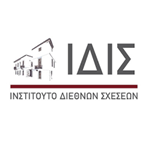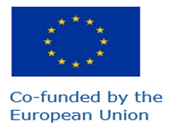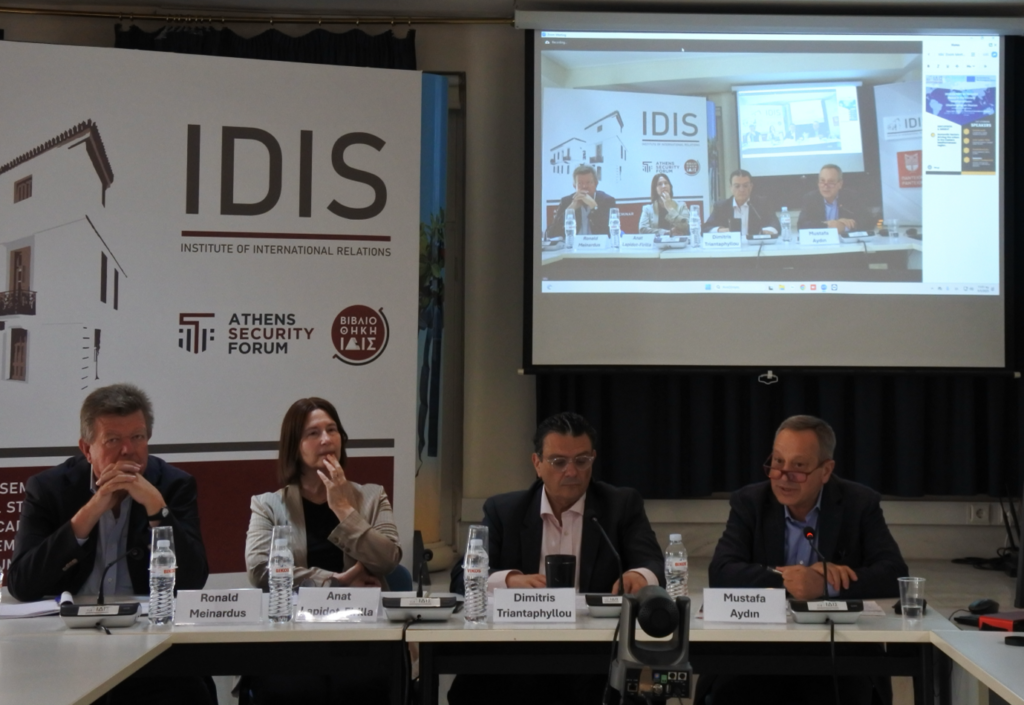


PROJECT REPORT
Peace in the Eastern Mediterranean: Challenging an Illusion

Introduction
On 5-6 May 2025, the Institute of International Relations (IDIS) in Athens, in collaboration with the Anna Lindh Foundation (ALF) successfully hosted a high-level expert workshop titled “Peace in the Eastern Mediterranean: Challenging an Illusion.” This significant event was part of the ALF in Motion programme (co-funded by the European Union), a strategic initiative aimed at enhancing intercultural dialogue through the active involvement of regional stakeholders.
The two-day expert workshop convened distinguished specialists and practitioners from Greece, Turkey and Israel, engaging them in robust discussions structured across two pivotal sessions. These sessions aimed to assess and unpack the primary obstacles and opportunities present in the Eastern Mediterranean region, focusing both on the internal drivers of instability and the transformative potential of civil society.
Session I (5 May): What are the domestic factors driving the crises in the Eastern Mediterranean region?
The first session, moderated by Dr. Dimitris Triantaphyllou, Director of Programs at IDIS, involved insightful presentations from Mustafa Aydin, Coordinator of the Global Academy (Istanbul), Anat Lapidot-Firilla, Executive Director of Fulbright Israel and Ronald Meinardus, Senior Research Fellow at the Hellenic Foundation for European and Foreign Policy (ELIAMEP, Athens). The discussion highlighted critical domestic factors fueling regional instability, including political polarization, judicial controversies and deep societal divides, particularly evident in nations like Israel and Turkey.
Participants identified key regional actorsTurkey, Israel, Egypt, and Greeceand underscored the significance of peripheral but influential states such as Syria, Lebanon, Libya, and Cyprus, as well as the role of the Palestinian Authority, alongside powerful external stakeholderssuch as the United States, Russia, China and the European Union. The deliberations articulated the complexity of energy competition, maritime disputes and security instabilities, emphasizing the importance of adopting a comprehensive, seatoshore perspective to promote cohesive and lasting solutions.
The session extensively explored the interconnected nature of these regional dynamics. Issues such as resource management, economic disparity and governance challenges were acknowledged as crucial factors exacerbating instability. Additionally, the potential impacts of climate change and migratory pressures were underscored as significant factors that require coordinated international responses.
Emphasizing the proactive role of civil society organizations, think tanks, and the media, the session explored innovative grassroots responses and advocated for heightened crossborder collaborations. The experts also recognized the robust technological innovation of some stakeholders in sectors such as cybersecurity and water management, stressing the importance of harnessing these capabilities for broader regional benefit and cooperative security frameworks.
Session II (6 May): The role of civil society in advancing a positive agenda in the Eastern Mediterranean Region
The second session, moderated by Stefanos Vallianatos, Coordinator of the Greek National Network of the Anna Lindh Foundation, further enriched the dialogue by examining the indispensable role of civil society in the Eastern Mediterranean. Mustafa Aydin, Anat Lapidot-Firilla and Dimitris Cavouras, Research Associate at IDIS, underscored the potent potential of civil society organizations (CSOs) operating at local, regional, and international levels while considering some of the conclusions drawn from the deliberations of the first session.
Local CSOs were highlighted as frontline responders in humanitarian, environmental and peacebuilding efforts, often characterized by deep-rooted community trust and flexible grassroots approaches. Regional CSOs, through their bridging capabilities, significantly contribute to regional dialogues and thematic cooperation. International CSOs, although facing occasional local skepticism and geopolitical pressures, were recognized for their pivotal advocacy roles and resource mobilization.
Nevertheless, significant challenges persist, including authoritarian restrictions on civic spaces, prevalent funding constraints and fragmentation within civil society sectors. The discussants advocated for enhanced coordination and emphasized the transformative potential of academic institutions, municipalities, philanthropic foundations and youth networks in bolstering crossborder cooperation and intercultural dialogue.
Discussions also highlighted successful case studies where local governments and municipalities effectively engaged in crossborder cooperation initiatives, such as the Mediterranean CitytoCity Migration project. These examples provided tangible evidence of the potential benefits derived from collaborative governance and civil society engagement.
The role of academia was further elaborated, underscoring its capacity to foster neutral spaces for dialogue and innovation, advancing evidence-based policymaking. Universities and research institutions were identified as pivotal actors in facilitating Track II diplomacy and fostering mutual understanding through scholarly exchanges and joint research projects.
The workshop concluded with strong consensus on the necessity of creating sustainable and inclusive dialogue mechanisms. It reaffirmed the vital role of civil society in advocating resilience, promoting regional cooperation and fostering mutual understanding and trust among Eastern Mediterranean nations.
Overall Assessment
This expert workshop not only facilitated essential knowledgesharing but also served as a catalyst for fostering future cooperation and actionable partnerships. By emphasizing collaborative dialogue and grassroots innovation, the event represented a significant step toward achieving sustainable peace and stability in the Eastern Mediterranean.
Looking forward, participants called for ongoing dialogues and increased engagement across multiple sectors, advocating for enhanced transparency, accountability and inclusivity in regional policymaking processes. It was recognized that sustainable peace is not merely the absence of conflict but rather the proactive construction of partnerships and mutual trust at all societal levels.
Through initiatives like the ALF in Motion programme, the Institute of International Relations (IDIS) and the Anna Lindh Foundation continue to empower regional stakeholders, supporting efforts towards cohesive, inclusive and resilient communities capable of addressing complex regional challenges effectively and collectively.
Athens, 15 May 2025
